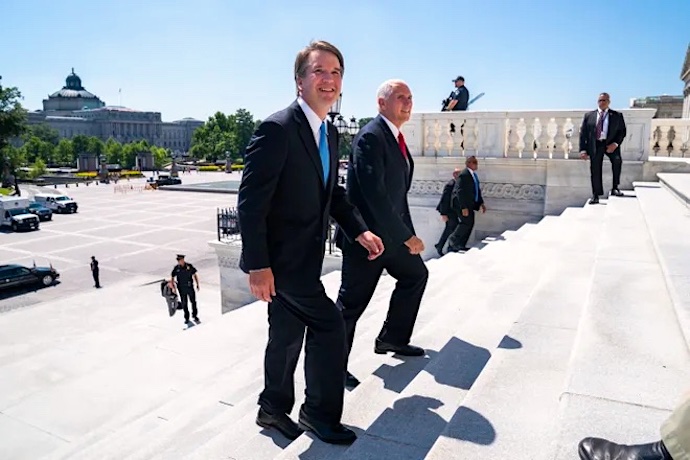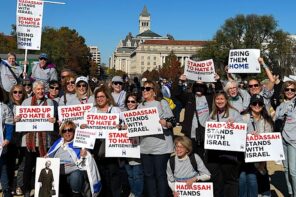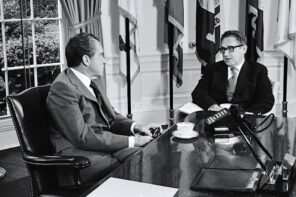Yeshiva University (YU), a storied New York City Orthodox Jewish institution, is the unlikely darling du jour of political and legal conservatives. Sued for discrimination by a group of students and alumni after it refused to recognize an undergraduate Pride Alliance group, YU claimed that New York State laws that require it to do so encroach upon its religious liberty. But YU would do well to proceed with caution. If the university wins this battle, which seems likely, the university may help deal a hard blow to the very cause YU claims to hold dear: a historically persecuted religious minority’s right to self-determination in a democratic society.
Far from a lofty and neutral constitutional principle, “religious liberty” (or, its cousin, “religious freedom”) has come to be intimately associated with an uncompromising illiberal political agenda that threatens the very foundations of American democracy, including its cherished individual and communal freedoms.
YU has long prided itself on its dual commitment to “the knowledge of Western civilization and the rich treasures of Jewish culture.” But here there seems to be an impasse between “Western civilization” (as reflected in New York City Human Rights Law which prohibits discrimination on the basis of sexual orientation and gender) and “Jewish cultural riches” (as reflected in YU’s interpretation of Judaism’s take on sexual and gender diversity). Frustrated with the university’s refusal to grant the Pride Alliance club status, a group of LGBTQ students and alumni who’ve been in discussion with the university about creating a safe space for queer and questioning students finally sued the university in 2022.
In its defense and in public statements, YU claimed that it embraces inclusivity and that it does not object to LGBTQ students’ presence on its campus. In fact, it seeks constructive dialogue with them. But YU maintains that it cannot abide by New York State’s antidiscrimination laws because the club is inconsistent with its interpretations of Jewish scripture, history, and culture.
In other words, what the university objects to is government interference in its affairs, not LGBTQ+ students on its campus. YU, which is represented by the Becket Fund for Religious Liberty, suffered a temporary setback in September, on procedural grounds, but the university will likely prevail if the case returns to the Supreme Court; Justice Alito all but promised this.
As the case winds its way through lower courts, the university has offered an olive branch in the form of a university-sanctioned alternative to Pride Alliance. Per its legal counsel, the new club, Kol Yisrael Areivim (all Israel are responsible for one another), doesn’t condone “the LGBTQ lifestyle” but is instead intended to provide LGBTQ students a space in which they can “support one another…within the framework of halacha [Jewish law].” The university has been coy about exactly what such “support” means, but that some Pride Alliance members denounced the new club as a “sham” speaks volumes.
Citing support from donors, faculty, alumni, policymakers, and the business community, the club’s intended beneficiaries view YU’s move as an attempt to shield it from internal critics. Indeed, YU is on the wrong side of history as ideas about inclusivity, acceptance, and even scriptural interpretation are rapidly evolving even within Orthodox Jewish communities.
While observant Jews remain divided on questions of sexual and gender diversity, a thriving LGBTQ+ student club has been operating at the Orthodox-affiliated Bar Ilan University in Israel for several years. Orthodox leaders in both Israel and the United States have voiced recognition, if not full support, for LGBTQ persons. And a major YU donor has publicly broken with YU’s stance on the issue. In other words, in claiming that it seeks to protect the Jewish people—a historically persecuted religious minority—from government interference, YU has opted to sidestep these dissenting Jewish voices.
YU is but the latest of a string of organizations that claim a religious freedom to discriminate. Yet in jumping on the religious liberty bandwagon, YU has aligned itself with an illiberal, authoritarian, nationalist, and xenophobic political agenda that weaponizes religious (and other) freedoms.
Historically, religious freedom wasn’t intended as a license to practice one’s beliefs unencumbered, free from state interference. Although secular institutions, including the Supreme Court, have long drawn on theology and religion to regulate sexual life in the United States, the general understanding was that the right to free exercise of religion was to be weighed against other rights and values, including the separation of church and state. The conservative legal movement has long sought to place the free exercise of religion at the top of the hierarchy of protected rights and activities and erode this wall of separation.
What makes the current conservative legal movement’s efforts so dangerous is that, in recent years, this sweeping illiberal agenda has weaponized religious freedom to promote a militant, literal, and illiberal Christian ideology that embraces Christianity as a bedrock American identity. This agenda not only claims a special place for religion in American culture but demands that the laws of the land be based on Christian morals, ethics, and history. In other words, it has its sights set on the rights and liberties not of religious minorities but of a dominant strand of American Christianity.
Moreover, while its legal arm pursues lofty principles in court, this agenda’s political arm is associated with political violence: the January 6 insurrection was rife with Christian symbolism, including the cross, Christian flag, Jesus flag modeled on the Trump campaign flag, and prayers; activists said that (a Christian) God empowered them. Religious freedom and political violence are intimately intertwined.
YU’s choice of legal counsel makes clear the stakes. The Becket Fund is a legal advocacy outfit with deep connections to the broader right-wing ecosystem (Senator Josh Hawley, who pumped his fist in support of January 6 insurgents, once worked for the firm). Although its tagline reads “religious liberty for all,” and rolling images on its website conjure a woke liberal arts campus rather than a rabid Christian warrior, Becket has embraced the conservative legal movement’s crusade against secular America.
The firm filed an amicus brief in the case of the Washington State coach who claimed a right to pray on the football field and is currently representing Seattle Pacific University which is being investigated by Washington State for discriminations against faculty and staff for violations based on sexual orientation. These, and other cases, turned on an expansive vision of religious liberty that also includes a variety of individual and community rights to practice their religion, irrespective of competing rights.
It goes without saying that religious freedom should not and need not be ceded to an illiberal and militant Christianity, and the concept’s varied uses and interpretations theoretically leave plenty of wiggle room to protect the free exercise of religion while guarding against the wall of the separation of church and state.
But buoyed by a receptive Supreme Court that is, as Andrew Seidel wrote in these pages, “bent on giving political whims the force of law,” the movement to expand Christianity’s role in public life has now moved far from the fringes of American political culture into the seat of power. In this environment, where “religious liberty” binds the conservative legal movement and illiberal political actors, minority religious groups, and especially Jews, might want to consider the wisdom of throwing their lot in with a militant Christianity seeking to privilege Christian values.
What makes the YU case so potent is that the party claiming religious liberty is not Christian. And, due to a legal quirk, despite being religiously affiliated, YU isn’t chartered as a religious institution at all. There’s some irony in the fact that the predominantly Christian conservative legal movement’s long quest to reframe religious freedom as the right to practice one’s faith as one sees fit—competing rights and interests be damned—may well come to full fruition in this case.
Undoubtedly, Orthodox Judaism’s flagship educational institution is invoking religious liberty in the name of preserving a religious minority’s rights. But YU doesn’t operate in a legal, political, or cultural vacuum. It therefore cannot ignore the fact that “religious liberty” is no longer an innocuous concept, but rather one that is rhetorically and politically associated with a movement that seeks to dismantle the wall of separation between church and state and is steeped in xenophobia, racism, and antisemitism. By aligning with a militant Christianity on a crusade against secular America, YU threatens the very principles that have allowed it, and other religious minority groups, to thrive. All American Jews, regardless of their stance on the LGBTQ question, should be wary of this outcome.





